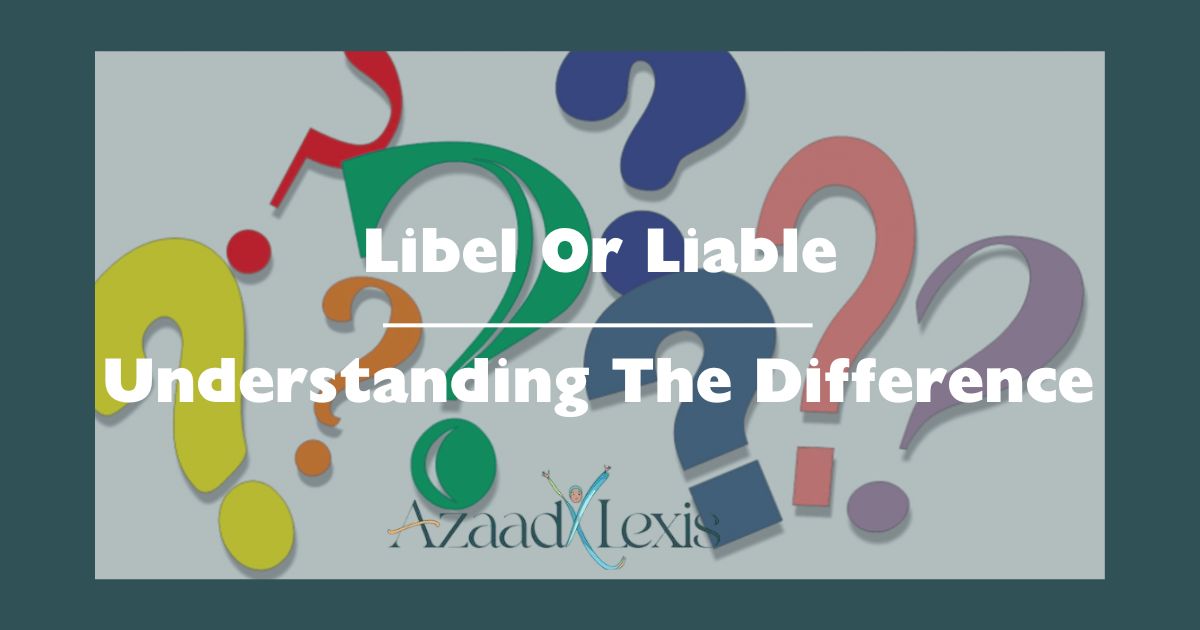Understanding the difference between libel and liable is crucial for clear communication, especially in legal contexts. While these words may sound similar, they have distinct meanings that can lead to confusion if used incorrectly.
In this article, we’ll explore the definitions, proper usage, and common mistakes associated with both terms. By the end, you’ll have a clearer grasp of when to use libel and when to use liable.
Why People Confuse Libel and Liable
The confusion between libel and liable likely arises because both words are often used in legal contexts. People might also mistakenly substitute one for the other because they sound similar. Liable can sometimes be used when someone refers to being responsible for damages or legal consequences, which can overlap with discussions about libel in legal cases.
Common Mistakes in Usage
- Saying “He is libel for the accident” instead of “He is liable for the accident.”
- Using “She is liable to be slandered” when it should be “She is liable to be libeled.”
These common mistakes occur because the spelling is close, and the terms are often used in similar contexts. However, knowing their definitions and appropriate contexts will help avoid confusion.
Read this Blog: Ways to Say “See You Tomorrow” Professionally
When to Use Libel and Liable in Sentences
The context in which you use them is key to getting it right.
Sentence Structure and Context
- Libel is used in contexts where false, defamatory content is involved. It typically refers to written statements or published material.
- Liable is used when referring to responsibility, often in legal or financial situations.
Situations Where They Are Used Interchangeably
It is important to remember that libel and liable are not interchangeable. They have very different meanings, and using them incorrectly can lead to confusion. In cases where someone is responsible for something, use liable. When discussing false statements that harm someone’s reputation, use libel.
Practical Examples in Everyday Language
Let’s look at some real-life scenarios where these words come into play:
- Libel: A local newspaper falsely accuses a business of fraud. The business owner could file a libel lawsuit against the newspaper for damaging their reputation.
- Liable: A person who causes an accident by not following traffic rules may be liable for the damages caused to others in the accident.
Tips for Content Writers
If you’re a content writer, using the words libel and liable correctly is essential for clarity and professionalism.
Using Libel and Liable Correctly in Content Writing
Be sure to use libel when discussing defamatory statements in written or published form. Use liable when discussing responsibility, whether legal or otherwise. This distinction ensures that your writing remains precise and effective.
Importance of Precision in Language
In the world of content writing, precision is vital. Using libel and liable incorrectly can make your work appear unprofessional. Whether writing about legal issues or simply discussing everyday events, understanding these terms will help you communicate effectively.
Conclusion
Understanding the difference between them is essential for clear and precise communication. While they sound similar, their meanings are quite distinct. Libel refers to harmful written or published false statements, while liable pertains to responsibility or potential consequences. By carefully considering the context in which you use these words, you can avoid confusion and ensure your language is both accurate and professional.

